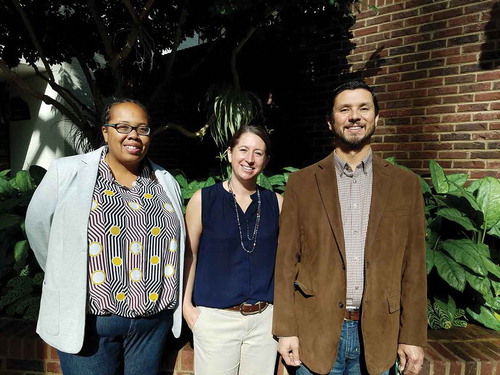Approximately four decades ago, AMLE, formerly the National Middle School Association (NMSA), published the inaugural position paper, This We Believe. This position paper, published two decades after the start of the middle school movement, documented a comprehensive middle school philosophy guided by key characteristics to guide teaching and learning in middle schools. Since the inaugural publication in 1982, This We Believe has been widely used to advocate for schooling specifically designed to holistically respond to the needs of young adolescents. Similarly to the start of a new year, each edition of This We Believe comes with a different sense of renewal and deep reflection of middle level education in relation to the world in which young adolescents live. As I, Lisa, co-wrote the latest edition with Penny Bishop, it was very clear that being responsive to the needs of young adolescents was a hallmark of middle school philosophy that needed to remain. However, it was also clear from the critiques within and outside of middle level education (Busey, Citation2017; Harrison, Hurd, & Brinegar, Citation2019) that a greater focus and commitment to equitable practices that was responsive to the vast diversity of young adolescents had to be incorporated into The Successful Middle School. This was necessary in order to honor and support marginalized young adolescents and their families who research demonstrates often face inequitable in and out of school experiences (Carter Andrews & Gutwein, Citation2020; Downing, Citation2019; Reyes, Citation2019).
One way that The Successful Middle School promotes more equitable practices is by being inclusive of the scholarship of middle level researchers, teachers, and teacher educators who have long been committed to culturally responsive and equitable middle level education. As editors of the Middle School Journal, we enter the new year and engage in deep reflection of our editorial responsibilities and the world around us, while we also take up this call for centering equitable and antiracist practices within middle level education through research that is published within the journal. We are dedicated to the journal serving as a resource for middle level educators in creating affirming school environments that sustain the dignity and support the learning and overall wellbeing of all young adolescents and particularly those whose voices and experiences are often absent in the research or discussed in deficit ways. For example, this issue of Middle School Journal discusses ways to foster positive family-school engagement. While many of the researched-based practices shared in this issue cut across all families, there is an intentional focus on countering deficit views of family engagement that persist about families of color and sharing practices specific to supporting English Language Learners and their families. To truly ensure that all families are viewed as valued partners, we have to take an intersectional approach to research.
As we move forward with volume 52 of Middle School Journal, we keep in the forefront AMLE’s commitment statement to be an ally and advocate in the continuing fight for racial equity and social progress which was released in response to the murder of George Floyd and the resulting mass global protests. Within that statement, AMLE outline several actions that the association will engage in including:
● Empowering middle school educators with resources to implement equitable and anti-racist policies and practices within their schools.
● Equipping middle school educators with tools to identify and address the racialized trauma so many of our students are currently experiencing.
● Contributing to improved dialogue, in part by amplifying the voices of students and educators of color through our publications and professional development events. (AMLE, Citation2020, para 4)
As editors of an official publication of AMLE, we too are deeply committed to these actions plus other anti-oppressive practices that consider how identities such as sexuality, gender, (dis)ability, socio-economic status, language, geography, age, race, ethnicity, and religion impact the school experiences of students, families, and community partners. We look forward to receiving future manuscripts that align with this mission and are committed to supporting authors during the submission process. It is only through such intentionality that schools can move to supporting all young adolescents.
References
- Association of Middle Level Education. (2020, June 10). As educators, we are called to respond to expressions of bias and racism in ourselves and others. https://www.amle.org/BrowsebyTopic/WhatsNew/WNDet.aspx?ArtMID=888&ArticleID=1160
- Bishop, P. A., & Harrison, L. M. (2021). The successful middle school: This we believe. Association for Middle Level Education.
- Busey, C. (2017, April 27). This who believes? A critical race discourse analysis of the association for middle level education’s this we believe. Paper presented at the 2017 annual meeting of the American Educational Research Association, San Antonio, TX. Retrieved from the AERA Online Paper Repository.
- Carter Andrews, D. J., & Gutwein, M. (2020). Middle school students’ experiences with inequitable discipline practices in school: The elusive quest for cultural responsiveness. Middle School Journal, 51(1), 29–38. doi:10.1080/00940771.2019.1689778
- Downing, B. (2019). Middle (mis)management: Staff sanctioned victimization in the middle grades. In K. M. Brinegar, L. M. Harrison, & E. Hurd (Eds.), Equity & cultural responsiveness in the middle grades (pp. 113–131). Information Age Publishing.
- Harrison, L. M., Hurd, E., & Brinegar, K. M. (2019). Exploring the convergence of developmentalism and cultural responsiveness. In K. M. Brinegar, L. M. Harrison, & E. Hurd (Eds.), Equity & cultural responsiveness in the middle grades (pp. 3–23). Information Age Publishing.
- Reyes, C. C. (2019). Practicing “unsettled listening” to the migration narratives of young adolescent refugees. Middle School Journal, 50(4), 16–25. doi:10.1080/00940771.2019.1650546

